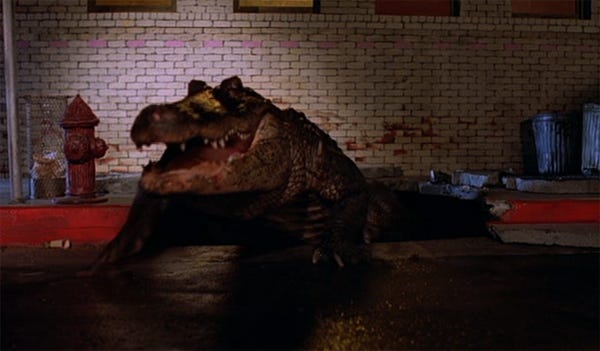Alligator (1980)

By the way the illuminati constantly rail on Hollywood's constant remaking of films, you'd think it was a new phenomena.
Be assured, it is not. Hollywood's long-standing tradition more than Sunset Boulevard or the Walk of Fame or even the famous sign, is aping a popular idea and sucking the life (and every cent) out of it.
And so exists 1980's schlock classic "Alligator," which targets the "killer monster animal" genre that "Jaws" catapulted into the cinematic statosphere in 1975.
The formula is simple: a monster-type animal that everyone is afraid of, make it giant, and unleash it.
Simple, right?
"Alligator," though, is a film that not only knows what it is, it gleefully embraces that status, resulting in a fun, entertaining movie.
Indeed, "Alligator" not only takes that famous shark flick as inspiration, but adds in the hard-boiled loner cop movie genre for good measure. Robert Forster ably plays Detective David Madison as a droll, grumpy, humorless schlub who knows his job, but isn't particularly loved among his peers because of his apparent penchant for losing partners.
When we first meet Madison he's buying a new dog, lamenting to the store clerk that his last dog was stolen when he left it outside a store. What he doesn't know is that the clerk is the dognapper, nabbing them wherever he can and selling them to a scientist who is conducting genetic experiments on the animals, then dumping their carcasses in the sewer when he's done.
Match this with the famous urban legend of a little girl whose daddy flushes her tiny pet 'gator (providing the film's best line, when the angry father shouts "That thing turded in the clothes hamper!").
The gator survives his trip to the sewers, finds the fresh dog meat, and over the course of a few years mutates into a 35-foot man-eating beast that soon terrorizes the city.
Madison, who is investigating the dog disappearances, takes a rookie cop into the sewer. The rookie is killed by the alligator, but Madison escapes, finds skepticism from his boss and his peers, who are so broken up at the death of a colleague that they hang a rubber alligator inside of Madison's locker as a joke.
When the story of the giant alligator hits the news, a reporter ventures down to the sewer with his camera. He too is killed, but in his death throes is able to snap a few shots of the leviathan. The police find the camera and develop the film (a device again stolen, this time from "Jaws 2").
The police send a SWAT team down to flush out the creature, but it evades them again before breaking through the street (either climbing the ladder to freedom or making quite a jump for even a 35-foot gator). Freed from the sewer, the gator manages to amble around the city streets without being noticed (save for by some kids who are of course can't get their parents to believe them).
The gator then crashes a dinner party, hides out in a city pond, and finally, in the film's most frightening sequence, finds its way into a swimming pool moments before a young boy decides to have an evening swim, leaping right into the monster's jaws.
The film features Michael Gazzo as the police chief who is Madison's friend, but seemingly makes his job as difficult as possible, including taking his badge for no good reason when the plot calls for it. Robin Riker plays the pretty herpetologist (that's reptile expert) who falls for Madison, and Henry Silva makes a short but memorable turn as a crazed gator hunter who quickly becomes obsessed with killing the beast. In one scene he seems to be hitting on a newscaster by using a gator's mating call.
For its time, the film features some pretty good effects, including a more or less believable giant gator, without the advantage of CGI that later films like "Lake Placid" had. Watching today, some of the effects seem silly, and the characters are predictably stupid, but "Alligator is nonetheless entertaining on a few levels, imminently watchable and a lot of fun.
